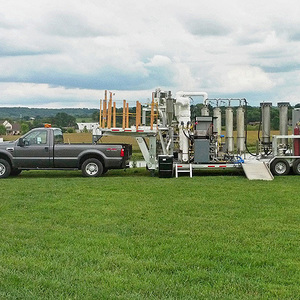USDA ARS scientists advance pyrolysis process




Mark Schaffer.
January 18, 2016
BY USDA Agricultural Research Service
The idea of replacing fossil-based fuel with a renewable source of sustainable energy is enough to get any environmentalist excited. USDA scientists have advanced a process to produce a crude liquid called “bio-oil” from agricultural waste. The team is headed by Agricultural Research Service chemical engineer Akwasi Boateng with the Sustainable Biofuels and Coproducts Unit at the Eastern Regional Research Center in Wyndmoor, Pennsylvania.
Crude bio-oil is produced by pyrolysis—a process that chemically decomposes plant and other organic matter using very high heat. The modified technique, called "tail-gas reactive pyrolysis," or TGRP, holds promise for improving the bio-oil that is ultimately processed into finished biofuels.
The Energy Independence and Security Act of 2007 mandates the United States produce at least 36 billion gallons of biofuels by the year 2022. This effort will require, in part, the development of a new industry to produce 21 billion gallons of advanced biofuels, which are based largely on non-food sources.
Advertisement
Advertisement
The raw biomass material includes non-food-grade plant matter procured from agricultural or household waste residue such as wood and switchgrass, and animal manures. Using these materials, bio-oils are produced at an accelerated rate using a new high-output mobile processing unit. Instead of shipping large amounts of agricultural waste to a refinery plant at high cost, the mobile reactor allows conversion of the biomass into energy-dense bio-oil right on the farm.
The goal of using TGRP on the farm is to yield a higher quality bio-oil that is more marketable to biofuel producers than bio-oil made from traditional pyrolysis methods. TGRP is an important step toward the ultimate goal of producing cleaner bio-oils that can be distilled at existing petroleum refineries.
Advertisement
Advertisement
ARS is USDA's chief intramural scientific research agency.
Read more about this work in the January 2016 issue of AgResearch.
Related Stories
The U.S. Department of Energy Bioenergy Technologies Office (BETO) announced up to $23 million in funding to support research and development (R&D) of domestic chemicals and fuels from biomass and waste resources.
The U.S. DOE has announced its intent to issue funding to support high-impact research and development (R&D) projects in two priority areas: sustainable propane and renewable chemicals and algal system cultivation and preprocessing.
Sens. Sherrod Brown, D-Ohio, and Pete Ricketts, R-Neb., in August introduced the Renewable Chemicals Act, a bill that aims to create a tax credit to support the production of biobased chemicals.
The Chemical Catalysis for Bioenergy Consortium, a consortium of the U.S. DOE’s Bioenergy Technologies Office, has launched an effort that aims to gather community input on the development of new biomass processing facilities.
USDA on March 8 celebrated the second annual National Biobased Products Day, a celebration to raise public awareness of biobased products, their benefits and their contributions to the U.S. economy and rural communities.
Upcoming Events










